Companies, research groups and reference entities in the agri-food sector analyze the keys to the industry in the second event of the year organized by the University of Valencia Science Park in the framework of Innotransfer, an open innovation program promoted by the five Valencian science parks with the support of the Agència Valenciana de la Innovació (AVI)
According to the Strategic Committee for Specialized Innovation (CEIE) of the AVI, according to the context in which the Valencian Community finds itself, the conference responds to the need to optimize production both in the primary sector and in the food industry, while betting on the development of new products that, with a focus on the consumer, contribute to promoting a healthier and more balanced diet.
The opportunity that the development of foods and beverages for precision nutrition, aimed at specific segments of the population, represents for the Valencian Region is one of the new challenges in the agri-food sector. This was one of the many points that were highlighted at the meeting Food chain: Challenges and solutions from primary production to consumption, which was held on September 20 at the Marie Curie Auditorium of the University of Valencia Science Park (PCUV) within the open innovation program Innotransfer, which has the support of the Valencian Innovation Agency (AVI).
In this line, Pedro Carrasco, director of the Science Park, gave a welcome speech in which he highlighted the purpose of the conference: food and the food chain. "These are current issues for various reasons, such as their importance for consumers and agri-food companies in the Valencian Community, for measures such as the creation of the agri-food PERTE that seeks to increase public-private collaboration in this sector, or for initiatives such as 'From farm to fork', which is part of the European Green Pact and aims to achieve climate neutrality by 2050, promoting the current agri-food system," he added.
In addition, the director of the PCUV presented the High Technology Incubator in Sustainable Agri-Food, AgrotecUV, of which he is the coordinator. "This initiative was born because we have a powerful science park with a reference ecosystem, both in research and transfer," he explained. He also added that "the University of Valencia is currently the leading university in Spain in agri-food, according to the Shanghai ranking". In this context, an incubator was created with the aim of promoting the creation of agrotech and foodtech startups based on R&D&I. Finally, Carrasco explained the requirements and benefits of the second call, which will close on October 17.
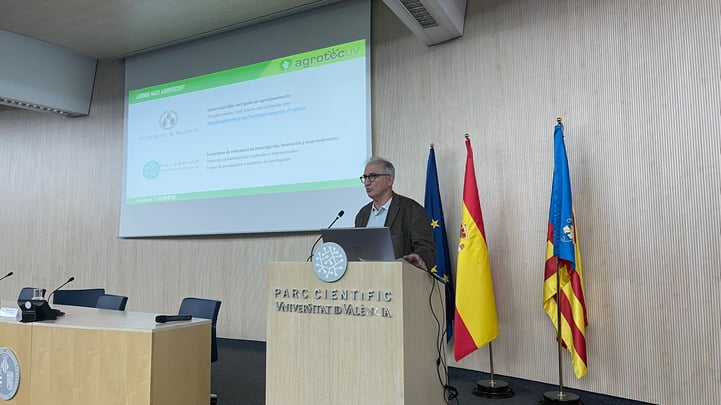
Pedro Carrasco, director of the Science Park of the University of Valencia, during the presentation of the High Technology Incubator in Sustainable Agri-Food AgrotecUV at the Innotransfer event. Photo: Innotransfer
For her part, Rosa Donat, Vice Rector for Innovation and Transfer of the University of Valencia stressed the importance of "optimizing production both in the primary sector and in the food industry, while promoting the development of new products that contribute to promote a healthier and more balanced diet with the focus on the final consumer". In addition, she highlighted the context of war conflict in Europe, a fact that marks "the need to increase collaboration between the actors involved in the agri-food value chain as a key element to mitigate the impact of socio-economic development on natural resources, while enhancing the health of people and the planet."
"In the coming years the food sector will be marked by a substantial change in consumption habits to promote a much healthier diet that helps prevent and combat various types of diseases. And in this context it becomes more necessary than ever fields such as precision nutrition, actions in food safety, and development of new foods and waste recovery, always with the focus on promoting a healthier living environment, "she concluded.
"In the coming years the food sector will be marked by a substantial change in consumer habits to promote a much healthier diet to help prevent and combat various types of diseases", Rosa Donat, Vice Rector for Innovation and Transfer of the University of Valencia
Olivia Estrella, General Secretary of the AVI, emphasized the importance of the agri-food chain in the Valencian Community, which "stands as a key sector in our region, both for its weight in the economy and its ability to vertebration at the territorial level". "This sector is made up of 3,000 companies, and as accredited by the Valencian Institute of Economic Research (IVIE), its economic impact is estimated at 10% of regional GDP and employs 12.2% of the employed population," he said. In turn, he added that "there are currently 130 thousand establishments of agricultural production, food and distribution, active in the three provinces", in fact, he noted that "the different links in the value chain generate about 240 thousand jobs, and its weight in the regional economy represented 9,400 million euros in 2021."
In this sense, at the national level, Estrella stressed that "the Valencian Community is among the three autonomous regions along with Andalusia and Catalonia, which contribute most to the development of the agri-food value chain in Spain". "This success story has placed us among the most exporting regions of the country, and is explained by the ability we have had innovation and adaptation to the changes that have shown over the decades the various links in the value chain," completed Estrella.
Agro-livestock activities and resource extraction
The need to optimize production in the primary sector, under environmental awareness, gives rise to the generation of technology with intelligent systems to improve agricultural production. This need, framed within the first phase of the food chain, marked the first round table of the day, which analyzed the importance that the food chain must start from a raw material that provides nutritional value in the user's diet in the final phase, since it will later be transformed and distributed in the second phase. In this sense, some solutions were presented in the detection of pests, as well as in the obtaining of agricultural products compatible with the environment.
Gustavo Gómez, CSIC researcher at the Institute of Integrative Systems Biology (I2SysBio), explained the main advances that were achieved in terms of intelligent systems in the detection and control of pathogens, and pointed out that "the changes that have occurred in recent years have been fundamental", as he explained that for a long time the different sectors working in research related to agriculture were separated into different departments, and with the improvement of knowledge of the regulatory mechanisms it began to be seen that "we were facing a problem that was clearly unique, in which the different crops reacted in a coordinated manner to different types of stimuli". Thus, detection tools began to be designed based on the identification of markers that could be common not only to the presence of the pathogen.
In this sense, the group led by the I2SysBio researcher is working on portable sensors that can be used by farmers in the field to know not only the presence of a pathogen, but also any other functional alteration that a crop may be suffering from any type of biotic or abiotic stress. For his part, Antonio Cerveró, Director of Innovation in Science and Technology at Rovensa Next, pointed out that there are three types of advances in this field, "the formulation, acceptance and management of solutions of biological origin and the commitment of organizations to be increasingly sustainable".
María R. Albiach, founder and CEO of ValGenetics, explained that they started "with classical molecular techniques and PCR, but with the arrival of ohmic and precision mass sequencing techniques it has been a real revolution in our company and in the sector". In fact, she said, "with mass sequencing we can identify all types of pathogens. He also referred to the existing collaboration with Gustavo Gómez's group, with which they are working on the generation of user-friendly diagnostic kits and diagnostic kits that help both plant health and companies, so that through their own laboratories they are able to control their plant stock, and can see how they are generating better and better quality products".
In the case of Professor of Physiology at the Universitat Jaume I (UJI), Aurelio Gómez, he emphasized "the generation of tools to try to establish the water status of crops in a simple, fast and transferable way to the sector". According to him, "there is technology available", but his group has "a technology that can still provide more to the farmer to establish the water status of his crop, and therefore the health of his plants, and their production". He also emphasized an in vitro culture system that allows them to grow plants on racks to produce metabolites of interest. "The industry has started to modernize, although it still has a long way to go. I'm not talking about biotech companies, I'm talking about agriculture companies, production companies," he concluded.
"The sector has begun to modernize, although it still has a long way to go. I am not talking about biotech companies, I am talking about agricultural companies, production companies", Aurelio Gómez, Professor of Physiology at the Universitat Jaume I (UJI)
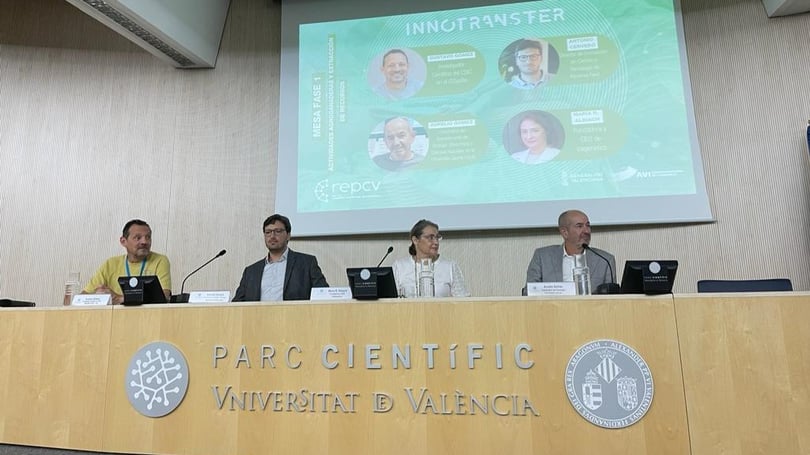 (From left to right) Gustavo Gómez, CSIC researcher at the Institute for Integrative Systems Biology (I2SysBio); Antonio Cerveró, Director of Innovation in Science and Technology at Rovensa Next; María R. Albiach, founder and CEO of ValGenetics; Aurelio Gómez, Professor of Physiology at the Universitat Jaume I (UJI). Photo: Innotransfer
(From left to right) Gustavo Gómez, CSIC researcher at the Institute for Integrative Systems Biology (I2SysBio); Antonio Cerveró, Director of Innovation in Science and Technology at Rovensa Next; María R. Albiach, founder and CEO of ValGenetics; Aurelio Gómez, Professor of Physiology at the Universitat Jaume I (UJI). Photo: Innotransfer
Food processing and distribution
At this stage of the food chain, products from the primary stage are distributed directly or after processing. Before reaching the consumer, the product may be subjected to different processes such as washing, peeling, cutting, grinding, or, for example, juices, fats or other components are extracted. There is a great variety of processes and products, as well as a high level of specialization and technification. In this sense, José Ángel Pérez, professor of the UMH Food Technology Area, explained that a large percentage of dates from Elche is not used, specifically, "more than 20,000 tons of edible dates" are wasted, and that is where they come in to "provide solutions to an identity fact". "The date is unique, as it is a source of nutritional wealth that most people are unaware of. It is a challenge to know what to do with the Elche date through valorization," he warned.
Thus, Juancho Escobar, founder and CEO of the company installed in the PCUV, Qomer, stressed that "by requiring as consumers and users of the ingredients the origin of the same, a new trend and a need arises, which is transparency". As he explained, "we come from a consumption model in which any type of material was served, but now we need these processes of transparency and these processes of traction within the entire food chain, so that we all know what our roles and challenges are to be able to raise all this information and be very reliable when telling the story of the ingredients".
Carlos Coquillat, founder and CEO of The Cottage Ritual S.L. in relation to the demand for more sustainable products by consumers, emphasized the information they provide in their establishment on the origin of coffee or the advantages of date products, so they try to "give a little push to the cultural change that consumers need". Finally, Manel Feltrer, CTO of WinusBio, defended that "it is necessary to promote startups and ideas, whether they have very advanced technologies or not". "Our future prospects are to publicize the project and continue with studies, to be able to present results" of a work dedicated to the transformation of orange waste generated in the Valencian Community.
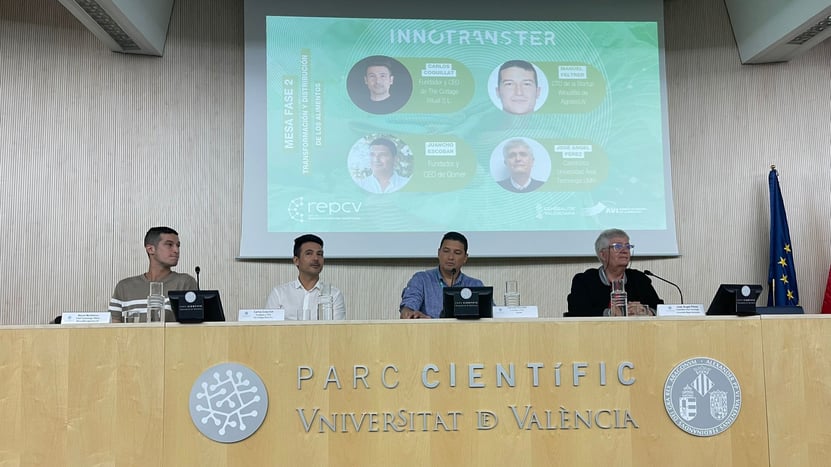 (Left to right) Manel Feltrer, CTO of WinusBio; Carlos Coquillat, founder and CEO of The Cottage Ritual S.L.; Juancho Escobar, founder and CEO of Qomer; José Ángel Pérez, professor of Food Technology UMH. Photo: Innotransfer
(Left to right) Manel Feltrer, CTO of WinusBio; Carlos Coquillat, founder and CEO of The Cottage Ritual S.L.; Juancho Escobar, founder and CEO of Qomer; José Ángel Pérez, professor of Food Technology UMH. Photo: Innotransfer
Food consumption and handling
Within this industry, the last stage of the food chain is one of the most important points. This is the last link, where the product reaches the final consumer. At this point, Francisco J. Barba, Professor of the Department of Preventive Medicine and Public Health- ALISOST UV, explained that they are working with different innovative processing technologies that "are of great interest to the consumer, because they can develop new foods that have food safety.
In turn, Purificación García, PhD in Food Science and Technology from the Universitat Politècnica de València, identified 3D food printing as one of the lines of research in which they worked from the group she leads. They started working on this line due to the "demands of chefs and collective catering companies". "3D printing does not come to revolutionize the market of new agri-food products, but in the end it is an alternative, for population groups that have certain special needs, for example, in the case of dysphagia or elderly people", and in these cases, she added, that "you can make a tailor-made food, because you can put the ingredients you need". Finally, she emphasized communication, especially "the challenge of asking the users of the products or technologies we offer if they really understand them".
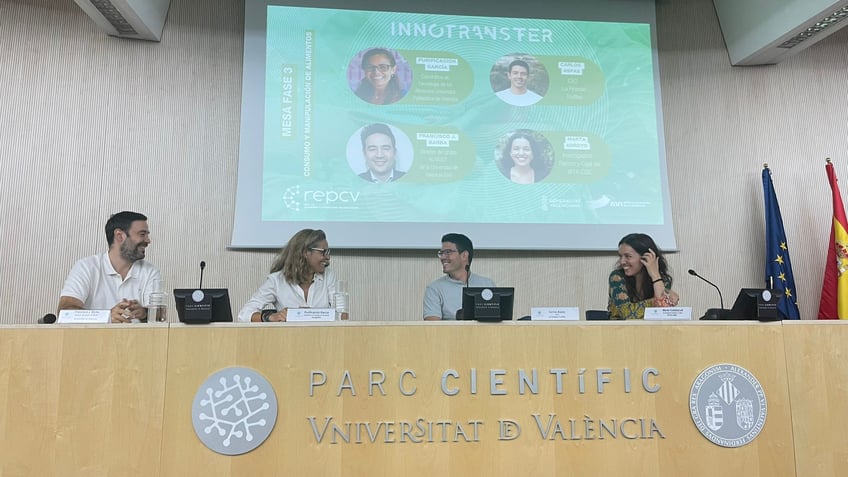 (Left to right) Francisco J. Barba, Professor of the Department of Preventive Medicine and Public Health - ALISOST UV; Purificación García, PhD from the Polytechnic University of Valencia in Food Science and Technology; Carlos Aspas, CEO and founder of La Finesse Truffles; Marta Calatayud, Ramón y Cajal researcher - IATA-CSIC. Photo: Innotransfer
(Left to right) Francisco J. Barba, Professor of the Department of Preventive Medicine and Public Health - ALISOST UV; Purificación García, PhD from the Polytechnic University of Valencia in Food Science and Technology; Carlos Aspas, CEO and founder of La Finesse Truffles; Marta Calatayud, Ramón y Cajal researcher - IATA-CSIC. Photo: Innotransfer
In relation to this topic, Marta Calatayud, Ramón y Cajal - IATA-CSIC researcher, pointed out that for her it is "very important to understand the connection we have with the whole environment and with what we consume". For this reason, she advocated "not to remain halfway in the process", so that "at the level of nutrition and health we must broaden the vision we have", since thanks to communication, she stressed that "many positive synergies can be generated to develop products that in the end are beneficial to health". She also considered it "very necessary to incorporate the microbiota in food safety processes, interaction and digestion processes, that is to say, to take it into account as a modulating element".
To conclude, from a business perspective, Carlos Aspas , CEO and founder of La Finesse Truffles, emphasized the challenges, specifically in product preservation. "We work with a product that has a very short shelf life", although having overcome this challenge in the short term thanks to the high pressure technique, they now set their sights on flavor. Finesse Truffles seeks to have "the ability to transfer the flavors of the products so that everyone can identify them and enjoy them in any preparation".
"3D printing does not come to revolutionize the market for new food products, but in the end it is an alternative, for population groups that have certain special needs, for example, in the case of dysphagia or elderly people", Purificación García, PhD from the Universitat Politècnica de València in Food Science and Technology
With the support of:


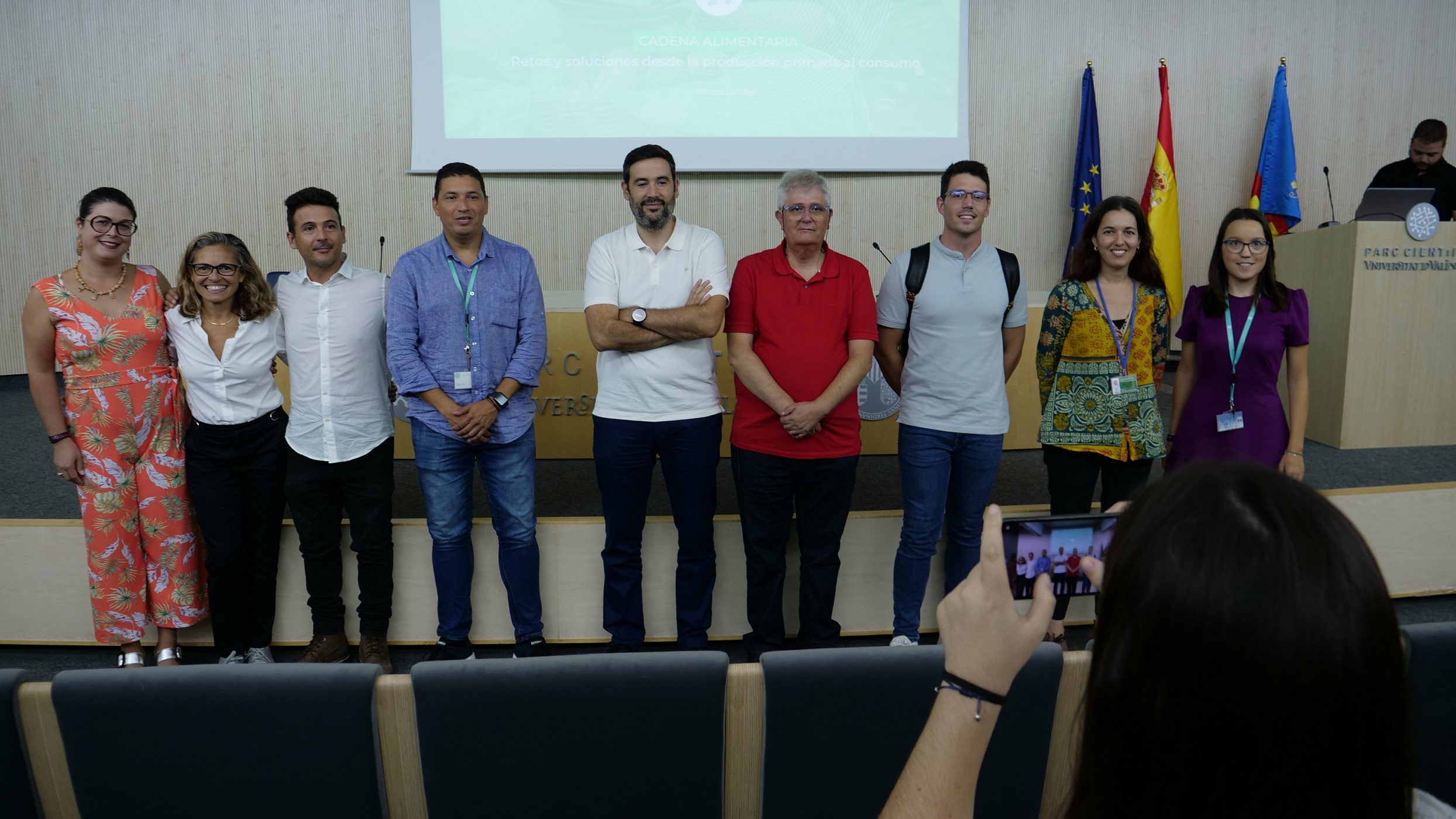
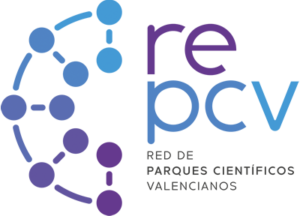
-1.png?width=800&height=248&name=Convivencia%20TOTS%20A%20UNA%20VEU-01%20(1)-1.png)